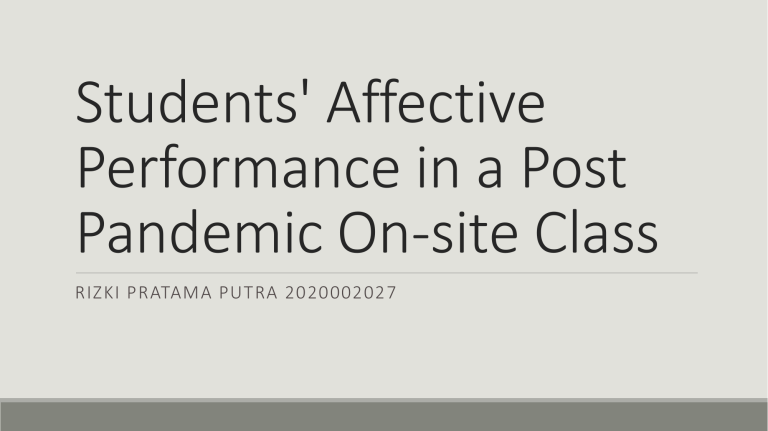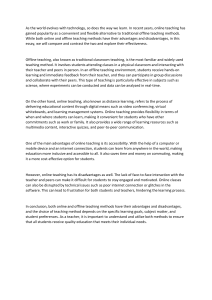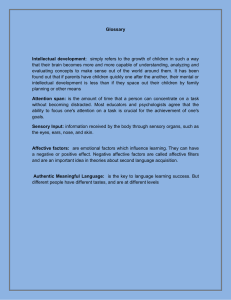
Students' Affective Performance in a Post Pandemic On-site Class RIZKI PRATAMA PUTRA 2020002027 Contents Introduction ◦ Background ◦ Literature review ◦ Theoretical Framework Method Results and Discussion Conclusion Introduction Background • 2022 is the year where the new normal in many countries has started and educational institutions start to do on-site classes (offline or face-to-face) • The transition between online and offline classes has impact on students affective performance • The research’s goal is to find the difference on students attitude in both online and offline classes and it’s impact on their learning outcome. Introduction Literature Review Students' affective performance study in online class Panaoura, Areti. "Using representations in geometry: a model of students’ cognitive and affective performance." International Journal of Mathematical Education in Science and Technology 45.4 (2014): 498-511. Students' affective performances study during before the pandemic, shows the relation between affective performance and cognitive performance. Panaoura, A. (2014). Using representations in geometry: a model of students’ cognitive and affective performance. International Journal of Mathematical Education in Science and Technology, 45(4), 498-511. Students' affective performances study before the pandemic, taking account of students' gender and socioeconomic background Thien, L. M., & Ong, M. Y. (2015). Malaysian and Singaporean students’ affective characteristics and mathematics performance: evidence from PISA 2012. SpringerPlus, 4(1), 1-14. Introduction Theoretical Framework Online Engagement Element Online Engagement Element Indicators (illustrative only) Social engagement Building community Creating a sense of belonging Developing relationships Establishing trust Cognitive engagement Thinking critically Activating metacognition Integrating ideas Justifying decisions Developing deep discipline understandings Distributing expertise Behavioral engagement Developing academic skills Identifying opportunities and challenges Developing multidisciplinary skills Developing agency Upholding online learning norms Supporting and encouraging peers Collaborative engagement Learning with peers Relating to faculty members Connecting to institutional opportunities Developing professional networks Emotional engagement Managing expectations Articulating assumptions Recognising motivations Committing to learning Redmond, Petrea, et al. "An online engagement framework for higher education." Online learning 22.1 (2018): 183-204. Method • A case study implementing quantitative study • The study was conducted on 9 students in an English Education bachelor degree class, attended both online and offline classes • The instruments used are open interview and questionnaires with 36 question and 5 data categories • The interview was conducted online using WhatsApp as a medium • 4-Point Likert Scale is used as range measurement in the questionnaire • The data was analysed using descriptive statistic Results and Discussion Results Interview “Honestly, the grades for the previous courses (online) were not good … I cannot be strict because the learning process itself is full of obstacles, perhaps because of the internet network or the motivation of students to learn. Finally, material achievements do not meet the standards … For face-to-face classes, students' mastery of learning materials is better. It will be even better if the motivation and learning activities in class are also good. However, what happens to students? Just before starting the lesson, many of them ask for permission and ask for online learning, which they may feel more comfortable with. But these strengths and weaknesses do not apply to all students. There are those who, because of their commitment to learning, are good at both online and offline learning.” Results and Discussion Results Questionnaire The data is divided into 2 types (online and offline class) with each has it owns 5 categories (social, cognitive, behavioral, collaborative, and emotional engagement) https://docs.google.com/forms/d/e/1FAIpQLSeMp01Gybcz0_1oDCuC4yMI09wEW2GgvsH6svzWZ2xMELtTiA/viewform?usp=sharing Results and Discussion Discussion • In the interview, the lecturer admitted that the grades in the previous (online) class were worse than in the present (offline) class • There are some factors that affects both students’ academic and affective performance, the most prominent one is the internet problem • After the transition to offline classes, the students are more comfortable to conduct online classes • From the table shown in previous slide, it can be inferred that: • Students are performing better in term of social and emotional after offline class transition • Students are performing worse in term of cognitive and collaborative after offline class transition • Students behaviors remained the same in both class Conclussion • There was a different level of engagement between online and offline classes • Offline class allows students to have better control of their emotion and socialize with their peers • Offline class does not guarantee students learning environment satisfactions Thank You



